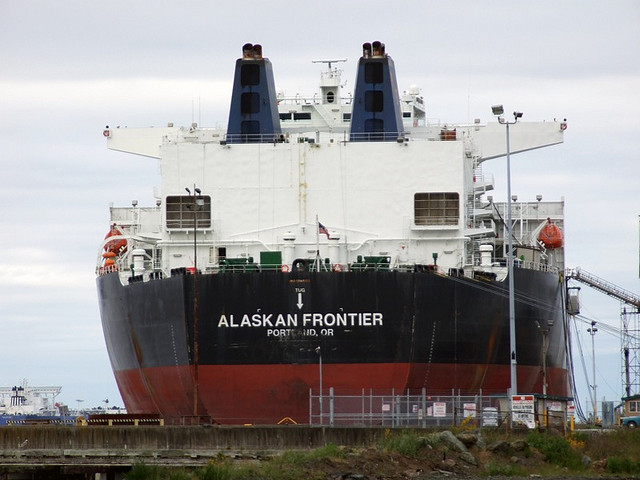If the oil industry gets its way, the US will soon begin exporting tankers full of American crude to overseas markets. Although such shipments are for the most part illegal today, the Obama Administration is quietly changing the rules to favor oil exporters.
To shed some light on the government’s behavior, the environmental law firm Earthjustice filed a formal Freedom of Information Act request in February on Sightline’s behalf, but it was greeted only by stony silence. So today, Sightline Institute, represented again by Earthjustice, is suing the federal government. We are asking the Courts to force the Obama Administration to do what it was legally required to by March 11: release information about its secretive deals with oil exporters to the public.
The federal government’s behavior is worrisome not only because of its plain disregard for public disclosure laws, but also because it violates longstanding laws that govern the oil industry. In fact, for nearly four decades, the US government has tightly restricted exports of domestic crude oil. The oil export “ban,” as it is commonly known, has been a prominent feature of the national energy landscape since the 1975 Energy Policy and Conservation Act—but the oil industry has it squarely in its crosshairs.
The American Petroleum Institute is calling for an end to the ban, and it has found willing partners in powerful US Senators from oil industry-friendly states, including Democrat Mary Landrieu of Louisiana and Republican Lisa Murkowski of Alaska.
Over the past year, the Obama Administration has started caving to industry wishes. In a series of secret rulings given only to select oil companies, a little-known federal agency, the Bureau of Industry and Security (BIS) has quietly exempted certain batches of crude oil from the export ban. Yet so murky is the underlying rationale for the apparent flip-flop in policy that the exemptions have provoked rampant and conflicting speculation even among industry players and media.
Mystified by the inconsistent regulation and concerned for the public interest, Sightline partnered with Earthjustice to submit a formal Freedom of Information Act request on February 10, 2015. The request asks for key information about the exemptions and for clarification about the reasoning behind them.
The only response to date? Silence. BIS has simply stonewalled Sightline’s request, despite multiple attempts by lawyers at Earthjustice to obtain a response and a March deadline for releasing the records.
Today’s lawsuit would compel the Obama Administration to disclose the information it owes the public. When faced with previous requests from the media, BIS tried to keep its moves cloaked from the public eye by invoking the Export Administration Act of 1979, which provides some cover for withholding certain types of export licensing information.
Yet as Earthjustice points out in today’s filing, that law is no longer in force. In fact, it lapsed in 2001, and it no longer provides any pretext for BIS to legally withhold information from the public.
Removing the ban—or even opening loopholes in it—could unleash environmental disaster. By opening new markets to US crude oil producers, loosening the ban could help induce large-scale fracking and drilling on sensitive lands and contribute meaningfully to imperiling the global climate. For some regions of the country—such as the Gulf Coast, with its abundant oil-handling infrastructure, and the Pacific Northwest, with its Asia-facing ports—it could also mean a flood of overseas-bound crude moved in by train or pipeline, increasing the risks of fires, spills, and other disruptions. And if the oil industry can bypass domestic refineries, the move may also threaten the livelihoods of the union workers who currently process America’s crude oil into useable consumer products like jet fuel, gasoline, and diesel.
Ending or eroding the 40-year-long ban on crude oil exports is a policy decision with enormous consequences. It’s one that is especially dangerous when made behind closed doors by an out-of-sight government agency in apparent consultation with industry lobbyists.
That’s why today, on Sightline Institute’s behalf, Earthjustice is suing the Obama Administration to force it to abide by the law and let the public know the full extent of the new exemptions to the crude oil export ban. We are asking the Obama administration to explain what it is doing and why—and to share with the public the truth about its secretive rulings and its intentions for America’s energy future.
See the full text of the complaint and the press release on the filing.


Comments are closed.